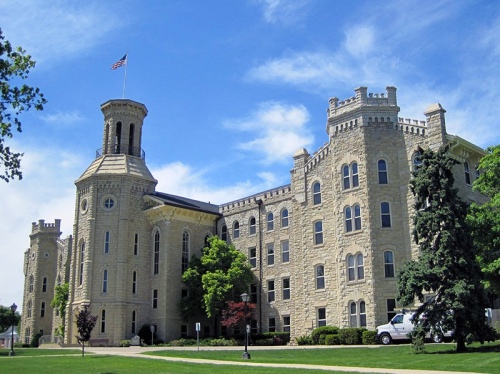About 50 evangelical Christian leaders gathered early this week to discuss the future of evangelicalism amid concerns their movement has become too closely associated with US President Donald Trump’s polarising politics.
The closed-door meeting Monday and Tuesday was held at Wheaton College, a private school outside Chicago that is sometimes called the “evangelical Harvard.” Wheaton attracts a theologically diverse mix of evangelical students and scholars with its focus on the liberal arts.

Blanchard Hall at Wheaton College near Chicago. PICTURE: Creative Commons
The session took place as Mr Trump’s evangelical advisers, a group often criticized for providing cover for the president’s unsavory behavior and language, are reportedly planning a June meeting between the President and as many as 1,000 evangelical pastors, similar to the meeting held in New York City during the 2016 campaign.
Mr Trump – who more than 80 per cent of white evangelicals voted for and still largely support – wasn’t the explicit focus of the Wheaton gathering, convened by Doug Birdsall, honorary chair of Lausanne, the international evangelical movement.
But Jenny Yang, senior vice president of advocacy and policy at World Relief, told Religion News Service beforehand, “All of us in the room know that’s the context in which we’re operating.”
Others agreed that Mr Trump’s alliance with white evangelicals had prompted the meeting, even as they sought to take the focus off him.
“Yes, the reason we are getting together is the 2016 election and the role that white evangelicals played in electing Trump,” said participant Katelyn Beaty, editor-at-large of Christianity Today and author of A Woman’s Place.
“But the content of our time together was not about the president and really not about the president’s evangelical advisory council. It was really about what does this mean for us and how have we gone wrong and how can we repair what’s clearly broken.”
The gathering aimed “to identify areas in which we may have missed the mark in terms of our witness to the world,” said Ms Yang, who co-chaired the meeting with Rev Gabriel Salguero, president of the National Latino Evangelical Coalition, and Bishop Claude Alexander of The Park Church in Charlotte, North Carolina. The agenda included time to reflect and lament, as well as to consider possible topics that evangelicals could talk about more deeply in the future.
Some of the topics discussed during the meeting included immigration, the role of women in the church, racism, how to disagree civilly with other evangelicals and the need to engage with the growing church in the Global South, according to participants and tweets posted during the gathering by Ms Beaty.
One quote Ms Beaty posted on social media from Rev Tim Keller, best-selling author and founding pastor of Redeemer Presbyterian Church in New York City, read: “There’s now a red evangelicalism and a blue evangelicalism.”
One meeting alone isn’t going to fix the problems that have been exposed within evangelicalism, Ms Beaty said.
But “I’m grateful that the conversation is happening,” she said. “You can’t start to address the problems inherent to our movement if you can’t talk about them.”
Others who attended the gathering included evangelical leaders from around the world, as well as well-known names in American evangelicalism, such as Rev AR Bernard of the Christian Cultural Center in New York City, who publicly resigned last year from Mr Trump’s campaign evangelical advisory board and spoke briefly about the board at the gathering; Trillia Newbell, director of community outreach for the Ethics and Religious Liberty Commission of the Southern Baptist Convention; Fuller Theological Seminary President Mark Labberton; and church historian Mark Noll.
One News Now reported that Richard Land of Southern Evangelical Seminary said that guest list suggested the real purpose of the meeting is to marginalise evangelicals who support Trump.
But co-chair Rev Salguero said: “It was not intended to be an anti-Trump meeting, nor was it. It was really about our public witness as evangelicals.”
And it left him feeling hopeful. The gathering wasn’t an echo chamber, he said. There was diversity – politically and racially, men and women, millennials and elder leaders of evangelical institutions. There was agreement. There was disagreement.
There needs to be more of that within American evangelicalism, Rev Salguero said.
“As evangelicals we struggle with a whole host of issues, and maybe we can do so better together in conversation,” he said.





